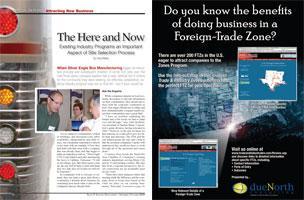
 When Silver Eagle Bus Manufacturing began its relocation process and subsequent creation of some 500 jobs over the next three years, company leaders had a clear, defined list of criteria for the community they were seeking. An effective, established, existing industry program was not on that list – but it soon would be.
When Silver Eagle Bus Manufacturing began its relocation process and subsequent creation of some 500 jobs over the next three years, company leaders had a clear, defined list of criteria for the community they were seeking. An effective, established, existing industry program was not on that list – but it soon would be.
“As we talked to communities, looked at buildings, and discussed costs, labor availability, transportation, and other issues, one community responded to almost every issue with an example of how they had dealt with that issue with a company that was already there and that began to make an impression with us,” Silver Eagle COO Craig Hanloh said after announcing the move to Gallatin, Tennessee. “It told us two things: one, that when issues come up, the city will be there to deal with them and, two, that once we’re here we will not be forgotten.”
As companies look to relocate or expand, they can learn a great deal about a community’s attitude about business by examining how much value it puts on the companies that are already there.
Ask the Experts
While companies depend on local economic developers to provide information on their communities, they should ask to meet with the corporate community as well. How eager officials are to oblige and how enthusiastically company leaders assist their communities says a great deal.
“I have no problem explaining the bumps and a few hoops we had to jump over and through,” says John Hawkins, vice president of Samick Music Corporation’s guitar division, having relocated in 2006. “However, in the end, we knew we had someone we could call to give us a little help and direction. The EDA and the city helped grease the way and I believe that the potential companies I spoke with understood they would not have to work through all of the questions and issues alone.”
 Courtney Ross heads the Nashville Area Chamber of Commerce’s existing industry department, serving Music City and its 10 surrounding counties. She says that from a regional perspective, the local connections are an invaluable asset on site visits.
Courtney Ross heads the Nashville Area Chamber of Commerce’s existing industry department, serving Music City and its 10 surrounding counties. She says that from a regional perspective, the local connections are an invaluable asset on site visits.
“There have been instances where that meeting made the difference and the company chose to locate here based on the value we place on our existing businesses,” Ross said. “We have also found that when a company has a strong relationship with the local economic development professionals they will encourage peers or suppliers to locate to their community.”
Delivering the Goods
Companies should not limit benchmarks to monumental successes, such as a community stepping up with financial assistance, training programs, and the like during expansions. They should focus on the scope of the overall existing industry program.
Some examples demonstrating a commitment to companies long after the headlines from announcements have faded are:
Recognition – This takes many forms, such as industry appreciation events, featured industry news releases, nominations for awards, and things as simple as congratulatory notes on occasions such as anniversaries or company successes.
Regular managers’ meetings – While providing interesting programs is a nice touch, simply putting company leaders in the same room may be the most meaningful service a community can provide. This networking opportunity builds a support system that understands common problems in a way no economic developer – regardless of experience and competence – can.
Connections with resources – Does the economic development organization include workforce development personnel, the state’s economic development department, local community college or university officials, and other experts in its meetings?
Value-added programs – One community recently introduced its “Trash to Treasure” program whereby companies provide lists of waste product that was adding costs or other hardship and the EDA seeks companies that could put the waste to use. One company immediately responded regarding the expense of having large containers hauled to the landfill. A company less than a quarter of a mile away responded that it could use the containers and both companies realized a cost savings.
Although these examples may not represent a significant impact on companies’ bottom lines, they demonstrate a community’s commitment to its businesses which will be greatly needed when more significant issues arise.
Friends in High Places
Another yardstick as to how close a relationship a community has with its businesses is the track record of companies helping their hometown in finding other prospects. Existing companies are a great lead source and savvy economic development organizations take advantage of those connections.
 Shoals Technologies Group is a world leader in the development and production of solar panel components. In 2008, the company relocated its corporate headquarters and added a second U.S. manufacturing plant. The company regularly connects local officials with customers that might have an expansion in the near future. Executives also have helped arrange a dinner at an industry trade show to introduce some of their corporate connections to local and state economic development officials.
Shoals Technologies Group is a world leader in the development and production of solar panel components. In 2008, the company relocated its corporate headquarters and added a second U.S. manufacturing plant. The company regularly connects local officials with customers that might have an expansion in the near future. Executives also have helped arrange a dinner at an industry trade show to introduce some of their corporate connections to local and state economic development officials.
“We have had a great experience with our move and we’re happy to help open other doors for both parties,” COO John Maros said. “Our reputation with these companies is everything to us, so they know we wouldn’t be making these introductions if we didn’t have all the faith in the world that, if they were to set up shop in here, they would have similar experiences.”
Conclusion
After all issues related to logistics, workforce, buildings and sites, and incentives have been resolved, the often overlooked question is how life will be after the site decision has been made. There is no need for companies to guess. The answer to that question is available to them in the form of the current companies and the community’s expansion and retention program. They just have to ask.

